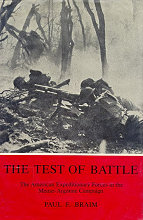
BRAIM : The test of battle (fülszöveg)
In The Test of Battle, Paul F. Braim recounts the history of the Meuse–Argonne Campaign, the only major campaign fought by the American Expeditionary Forces in World War I, and investigates the performance of the AEF and its leaders, notably General John J. Pershing, its commander-in-chief.
Delving into newly acquired files and memorabilia, Braim outlines Pershing's conflicts with the War Department in Washington and with our Allies in France, revealing how the Allies employed every military and diplomatic means possible to have U.S. troops serve with their armies rather than to form an American army in France. With great discernment Braim details the great difficulties encountered by the American army sent by the United States to fight in cooperation with the Allied armies in France as it expanded and reorganized to twenty times its peacetime strength; he explores the problems faced by the army's leaders in their hasty attempt to train and equip the forces for modern warfare.
In this thoughtful history, Braim describes the hectic months during which the AEF organized its theater: the thousands of new arrivals who were "shipped through" each day, the training and battlefield orientation programs frequently interrupted by the need to reinforce the Allied defensive lines, and the introduction to fire of the fledgling American First Army in the St.-Mihiel offensive.
Hurried into attack positions facing the formidable German defenses, the least experienced troops of the AEF led the American attack in a deadly test of battle: the Meuse–Argonne. Braim's description of the grim fighting evokes the sounds and smells of the muddy battle fields as the troops drive north into increasing fire and a final bloody victory on the heights overlooking Sedan.
The Americans gained their objective at great cost—but while Braim praises the AEF for its bold and courageous fighting, he offers considerable evidence of lamentably inadequate and inappropriate training and of leaders insufficiently skilled or experienced to meet the special demands of this kind of warfare.
The author renders a sensitive account of the battlefield conditions, but he objectively criticizes the commanders' inability to recognize new developments in modern warfare—a failure that resulted in the loss of many American lives.